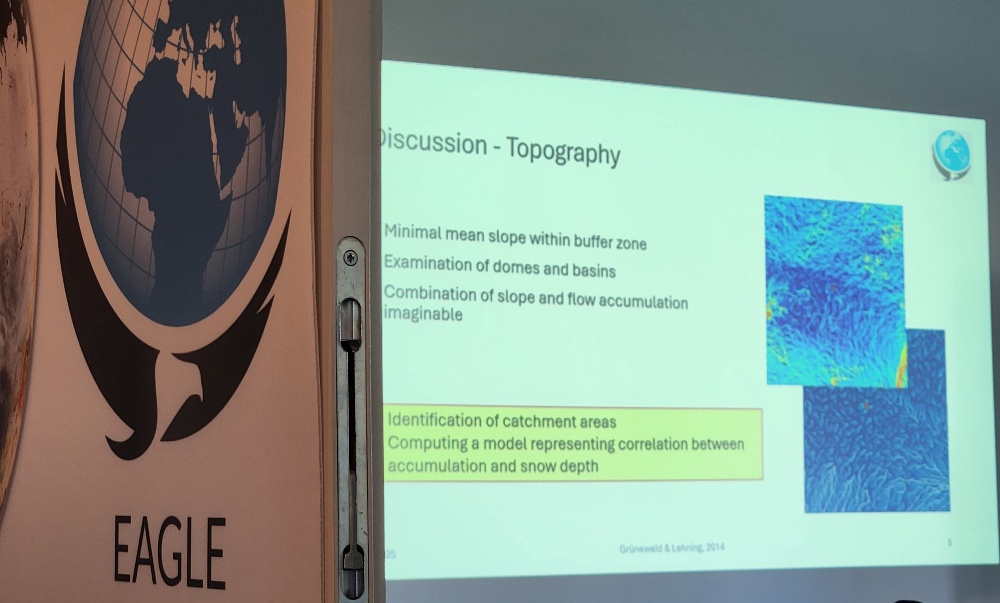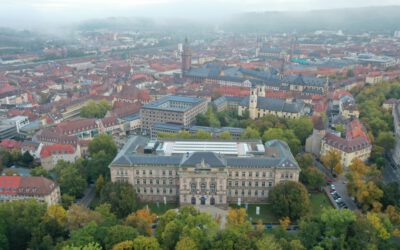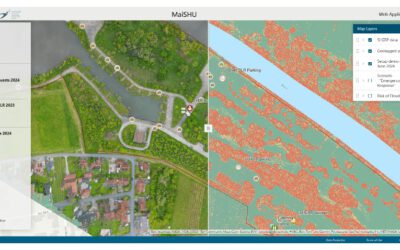EAGLE MSc students recently showcased their research findings on snow depth and its driving factors at the Schneefernerhaus Environmental Research Station on Zugspitze, Germany’s highest peak. Their work, conducted under the supervision of PhD students Elio Rauth and Basil Tufail, is part of the EORC UAS team’s ongoing efforts to advance environmental monitoring through Unoccupied Aerial Systems (UAS).
Cutting-Edge Data Collection at High Altitude
Using state-of-the-art drone technology, the students carried out high-resolution UAS data acquisition over the snow-covered terrain. Their analysis focused on measuring snow depth variations and identifying key influencing factors such as temperature, wind patterns, and solar radiation. The project contributes to a better understanding of alpine snow dynamics, which are critical for climate studies, hydrology, and avalanche risk assessment.
Presenting Findings at Schneefernerhaus
The students presented their preliminary results to fellow researchers at EORC. Their work highlights the potential of UAS-based remote sensing in improving the accuracy and efficiency of snow monitoring compared to traditional methods. The collaborative environment at Schneefernerhaus allowed for insightful discussions, further refining their approaches for future research.
Strengthening UAS Applications in Environmental Science
This field study is part of the EORC UAS team’s broader mission to integrate drone-based remote sensing into environmental and climate research. Our EAGLE MSc students will continue to acquire more data and explore other approaches of in-situ measurements and UAS applications, paving the way for more innovative, data-driven approaches in alpine research.
The EAGLE program remains committed to equipping students with hands-on experience in cutting-edge geospatial technologies, preparing them for impactful careers in environmental research and beyond.
Stay tuned for more updates on our students’ exciting research adventures!
you may also like:
Monitoring Urban Heat with Multi-Sensor Earth Observation: The SMART-TWIN Project
Urban areas are increasingly exposed to heat stress, making climate-sensitive planning more important than ever. As part of this effort, our team has recently started a new project focused on urban heat monitoring using multi-sensor Earth Observation approaches. The...
Supporting Crisis Mapping from Above: Our Contribution to ZKI Activation Tests
As part of the exploration of UAS in crisis activation activities coordinated by the DLR Center for Satellite Based Crisis Information (ZKI), the EORC UAS research team contributed high-resolution airborne data to support the generation of geospatial products. Our...
EORC at the Savanna Science Network Meeting in Skukuza
Researchers from the Earth Observation Research Cluster (EORC) at the University of Würzburg are pleased to take part in this year’s Savanna Science Network Meeting, held in Skukuza, Kruger National Park. Our EORC is represented by Dr. Mirjana Bevanda and PhD...
CHARM-EU workshop on earth observation
This week, the CHARM-EU teaching by the EORC staff continued. Over the past days, Florian Betz stayed at the University of Montpellier for a workshop with the water track master students of CHARM-EU. Topic of the workshop was the use of earth observation and...
Project EO4CAM Supports Municipal Adaptation to Heavy Rainfall Events
How can municipalities effectively reduce the impacts of increasingly frequent heavy rainfall events? This question brought together local and regional stakeholders on 24 February 2026 at Wartmannsroth town hall in the district of Bad Kissingen, Germany. Participants...
Guest talk at ENS Lyon
Our PI Florian Betz was invited to give a seminar talk about his research on remote sensing of river dynamics at the ENS Lyon in France. The seminar "Cafe Fluvial" is part of the doctoral training and research network "H2O Lyon" in which a number of research...









